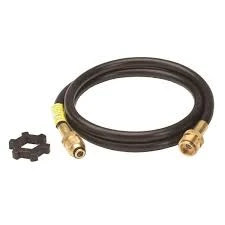High-Performance Oil-Resistant Rubber Hoses for Versatile Applications in Industries
ნოე . 17, 2024 13:38 Back to list
High-Performance Oil-Resistant Rubber Hoses for Versatile Applications in Industries
The Versatility and Importance of Oil Rubber Hoses
Oil rubber hoses play a pivotal role in various industries, primarily due to their exceptional flexibility, durability, and resistance to environmental factors. These hoses are engineered specifically to transport petroleum-based products, making them indispensable in sectors such as oil and gas, automotive, and industrial applications.
One of the key features of oil rubber hoses is their composition. Typically made from a blend of natural and synthetic rubber, these hoses are designed to withstand high pressures and extreme temperatures. The rubber material not only offers flexibility, allowing for easy maneuverability and installation but also provides excellent resistance to oil, fuel, and other chemicals. This chemical resistance ensures that the integrity of the hose is maintained over time, preventing leaks and potential hazards.
In the oil and gas industry, the demand for reliable and efficient transportation of crude oil, gasoline, and diesel is paramount. Oil rubber hoses serve as vital conduits, enabling the safe transfer of these flammable products between storage tanks, refineries, and transportation vehicles. Their ability to handle high-pressure situations makes them ideal for such demanding environments. Moreover, many manufacturers incorporate additional layers of reinforcement, such as wire braiding, to enhance the strength and burst resistance of these hoses, ensuring they can withstand the rigors of tough industrial applications.
oil rubber hose

Beyond the oil and gas sector, oil rubber hoses are also extensively used in the automotive industry. They are found in fuel delivery systems, hydraulic systems, and engine cooling systems. The flexibility of these hoses is particularly beneficial in automotive applications, as they can easily navigate tight spaces and complex routing without kinking or cracking. Furthermore, modern oil rubber hoses are often treated with anti-aging and anti-ozonant compounds, prolonging their lifespan and enhancing their performance in various climatic conditions.
Another critical aspect of oil rubber hoses is their ease of maintenance. Regular inspections for wear and tear can help prevent unexpected failures and ensure safety in operations. Additionally, many hoses come with standardized fittings, making replacement and installation straightforward, which is essential for preventing downtime in industrial processes.
In terms of environmental considerations, advancements in hose manufacturing have led to the creation of eco-friendly options. These alternatives fulfill the same performance requirements as traditional oil rubber hoses but are designed to reduce environmental impact. As industries increasingly shift towards sustainable practices, the demand for such products is likely to grow.
In conclusion, the significance of oil rubber hoses in industrial applications cannot be overstated. Their combination of flexibility, durability, and chemical resistance makes them an essential choice for transporting oil-based products in various sectors. As technology continues to evolve, the development of more advanced and environmentally friendly hoses will further enhance their importance in modern industry, ensuring safe and efficient operations for years to come. Whether in oil fields, automotive workshops, or manufacturing plants, oil rubber hoses remain a critical component of successful industrial practices.
Latest news
-
Air Conditioning Charging Hose: Durable AC Recharge Kits
NewsAug.22,2025
-
Premium 4890 AC Hose | Durable & Perfect Fit Replacement
NewsAug.21,2025
-
High-Quality AC Hose: Compressor to Evaporator for Car
NewsAug.19,2025
-
Glass Storage Jar with Acacia Vacuum Vented Cover - HEBEI KEMO|Thermal Resistance, Food-Grade Safety, Eco-Friendly
NewsAug.18,2025
-
Glass Storage Jar with Acacia Lid - Hebei Kemao | Heat-Resistant, Eco-Friendly
NewsAug.18,2025
-
Glass Storage Jar with Acacia Vacuum Vented Cover - HEBEI KEMO|Thermal Resistance,Eco-Friendly Storage
NewsAug.18,2025
